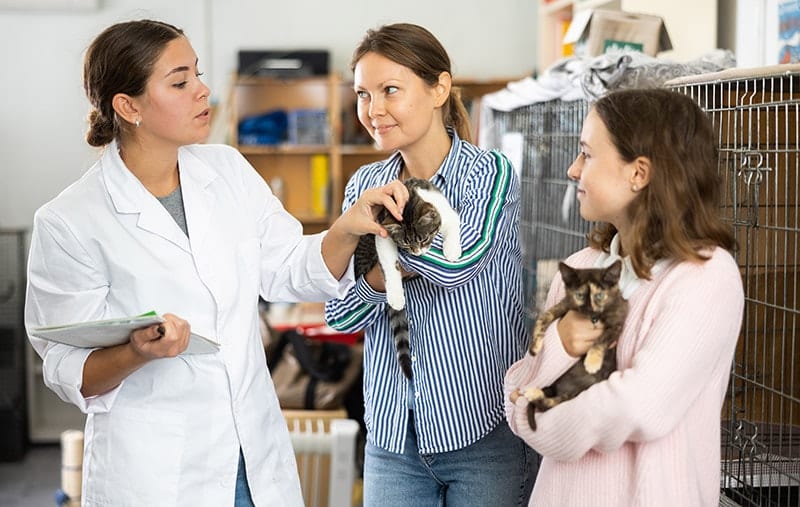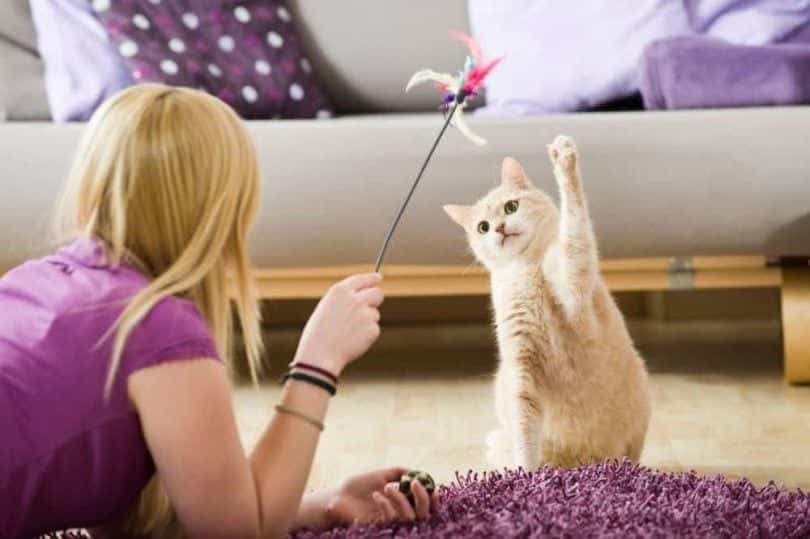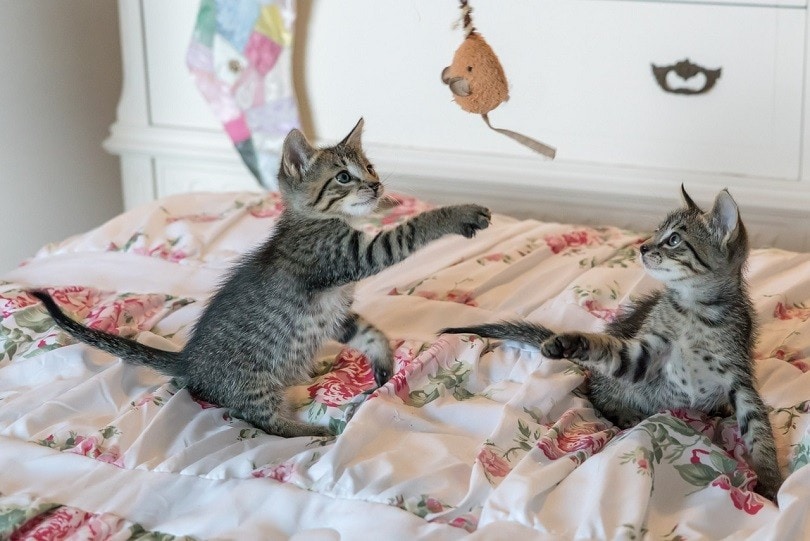[ad_1]
Single kitten syndrome refers to behaviors sometimes displayed by kittens adopted alone into a single-cat household or who, for whatever reason, go through kittenhood without littermates or other feline companions.
Though not officially recognized, it’s clear to many rescue organizations that single kitten syndrome is a very real thing and that it sometimes affects successful adoptions. For this reason, it’s important to get clued up on single kitten syndrome if you’re thinking about adopting a fluffy friend sometime soon.

What Is Single Kitten Syndrome?
Often, when you’re in talks with a rescue organization about adopting a kitten, you’ll find that they recommend adopting a pair rather than a single kitten. For some organizations, it’s a cast-iron requirement that cats under a certain age don’t go to their new homes alone. There’s a good reason for this.
When kittens are raised alone without companions, they miss out not only on important social interactions but also essential lessons in how to socialize and play appropriately. In a litter, kittens give one another feedback, which means their responses to certain behaviors help instill in one another what’s acceptable and what is not.
For example, if one kitten plays too roughly with another and hurts them, the other kitten may cry out, and the mother of the litter will often jump in to correct the inappropriate behavior. These cues from mom and their brothers and sisters teach the kittens that what they’re doing is not okay and won’t be tolerated.
If a kitten doesn’t have these kinds of interactions and corrections, they sometimes carry inappropriate behaviors like biting into adulthood and direct them toward humans. In addition to learning to play nicely, kittens learn how to use the litter box by following what their mom and littermates do.

What Are the Signs of Single Kitten Syndrome?
Single kitten syndrome manifests itself in a variety of unsavory ways, and most are related to how they interact with humans. Unfortunately, some adopters opt to return their kitties with these problem behaviors as they don’t know how to manage them. Cats with this “syndrome” will likely display some or all of the following behaviors:
Note: Not every kitten that is adopted alone will display these behaviors—most adapt very well to their new homes without any problems. Each case is unique, and organizations tend to treat each one as such when deciding what kind of home or living situation would be best for an individual kitten or cat.
- Biting hard during play
- Using claws during play
- Excessive clinginess
- Biting your ankles when you walk by or walk away
- Chewing objects around your home
- Scratching furniture or other objects they shouldn’t scratch
- Going to the bathroom outside the litter box
- Suckling on fabrics and sometimes even on you or other pets
- Attention-seeking
- Excessive vocalizing

What Are the Causes of Single Kitten Syndrome?
In a nutshell, single kitten syndrome is believed to be caused by a lack of social interaction with other cats at a young age, and there are several reasons why a kitten may miss out on these interactions. One example is if a kitten is found orphaned and is fostered in a home without any other kitties.
Most cases of reported single kitten syndrome, however, involve kittens who are adopted alone and go to a home without kittens of a similar age. Even if a kitten has been raised as one of a litter or with similarly aged companions, the socialization process isn’t over once a kitten goes to a new home. Adopted alone, they may feel lonely in their new homes, especially if their human companions spend several hours a day away from home.
Furthermore, even if you already have an adult cat at home, this can’t always provide your kitten with the type of socialization they need due to a mismatch in energy levels, but this depends on the personalities of the individual cats. Some cats remain very playful into adulthood and welcome new friends to play and snuggle with, whereas others may quickly get fed up with the new kitten’s (sometimes impolite) invitations to play.
The same goes for homes with dogs. Some cats and dogs get along like a dream and play together frequently—which is great for both of them and helps prevent loneliness and stress—but dogs and cats don’t learn the same behaviors (like using a litter box), so the dog can’t really model all the appropriate behaviors for your kitten.
Unfortunately, there isn’t currently any research that backs up the existence and therefore causes of single kitten syndrome. In fact one recent study didn’t actually find a link between early social exposure and aggression and reported that the majority of factors associated with aggression were related to the cat’s personality, home environment and training methods.

How Do I Care for a Kitten with Single Kitten Syndrome?
Of course, this depends on the advice offered by the rescue organization, but if they think it would be in the kitten’s best interest, please consider adopting two together. If you’ve already adopted a single kitten but have decided you want to adopt a companion for them, it’s not too late to reach out to a rescue organization.
Some people are put off because of the extra responsibility involved in parenting two cats, but you may reap rewards in other ways—kittens with companions have an outlet for their energy and are less prone to loneliness, which means better behavior and a more relaxed household overall. In that sense, two kitties could well be easier than one!
The most important thing is to communicate with the rescue organization to ensure the best human-kitty match possible. As mentioned above, adoptions are treated on a case-by-case basis depending on what’s best for the individual kitten.
If adopting two kittens really isn’t an option for you, you’ll need to make sure your kitten has plenty of opportunities for mental stimulation and play. You’ll also need to instill a sense of boundaries in your kitten to help teach how to interact appropriately. Here are some tips:
- Play with your kitten regularly with toys like chaser wands (they can’t get near your hands if you use these).
- Redirect aggressive behaviors onto a toy.
- Use puzzle feeders to keep your kitten busy, especially if you’re going to be out of the house for a while.
- Don’t encourage your kitten to bite your hand. It might not hurt while they’re kittens, but it’s a whole other story if an adult cat does it. Immediately take your hands away if this happens and tuck them under your armpits.
- If your kitten is biting you and won’t stop, calmly get up and walk away to show them you won’t engage with them when they’re doing that.
- Provide cozy, safe spaces to help your kitten feel secure.
- Start litter box training straight away by regularly placing your kitten in the box. Move the (clean) litter around with your hands to show them how to paw at it. Reward them when they use the box. Put the box in a quiet, calm, easily accessible, well-lit area.
- Make sure everyone in your home is on the same page in terms of not encouraging aggression.


Frequently Asked Questions (FAQ)
What If the Rescue Organization Won’t Let Me Adopt Only One Kitten?
Some rescue organizations make it a requirement that kittens are adopted in pairs, though some might make exceptions in certain cases if it’s best for the kitten in question.
Whatever the rules of the organization, respect them—they’re in the kittens’ (and therefore your) best interests and are in place for good reason. If a pair is a no-no for you, you might want to consider adopting an older kitten or an adult cat. Work with the organization to find the best match for you—they’re there to help.
What Are the Benefits of Adopting Two Kittens?
As explained above, kittens learn important social lessons from one another so they can grow up to be well-rounded and non-aggressive (and therefore more trainable), but they also provide one another with companionship.
They play together, snuggle together, and groom one another, which gives each kitten a sense of security and takes some of the pressure off you (plus, it’s adorable to watch). Best of all, adopting two kittens means two lives are saved.


Conclusion
While there may not be any scientific evidence of single kitten syndrome, many rescue centers believe that it can be very damaging long term and incredibly stressful for both you and your cat. For this reason, if a rescue organization recommends or requires that you take two kittens, please consider it. Alternatively, there are plenty of sweet older kittens and loveable adult cats that would be thrilled to be the only pampered prince or princess in your home!
Featured Image Credit: Zarubina_Yuliya, Shutterstock
[ad_2]
Source link
